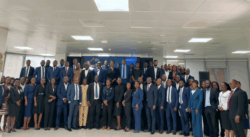Consulting President of Laweh Open University College, Professor Goski Alabi, has called upon developed economies to learn from Africa the practices it has adopted to cope with the COVID-19 pandemic.
“Africa has proven that there are some practices which have helped it cope with the COVID-19 pandemic. Europe and the rest of the developed economies should start learning from Africa how it managed the pandemic.” According to her, Africa’s posture regarding COVID-19 is an opportunity for collaborative research on how to handle the pandemic.
Prof. Alabi made the call in an interview with the European Association for International Education (EAIE). The interview focused on Internationalisation of Education in Africa. The EAIE is the European centre for expertise, networking and resources in the internationalisation of higher education. Internationalisation of higher education is the process of integrating an international, intercultural, or global dimension into the purpose, functions or delivery of post-secondary education.
Orla Quinlan, Director of Internationalisation at Rhodes University, South Africa, also featured on the programme. She currently serves as President of the International Education Association of South Africa (IEASA), an organisation in which she has held a variety of leadership positions since 2011.
On COVID-19 and education, Prof. Alabi observed that Africa responded quite swiftly – although not as expected – with the introduction of virtual learning. She however admitted there have been challenges with unreliable power supply and lack of electricity in some rural communities. “What now remains critical is how to carry everyone along and make sure no one is left behind,” she noted.
She is also chairperson of the African Network for Internationalisation of Education (ANIE), West African Representative of the African Council for Distance Education (ACDE), and co-founder of Laweh Open University College.
She disclosed that ANIE is making strides in the area of capacity building, especially in doctoral research, and has come out with a lot of publications on major themes: including blended and online learning; developing internationalisation strategies; and also exploring more ways to make their platforms more accessible.
She revealed that ANIE is giving priority to issues such as Effects of Internationalisation on Education in Africa; Research Collaboration; Virtual Internship and its Advantages and Disadvantages.
Prof. Alabi said it has become imperative for all stakeholders to look at matters pertaining to prepping students and staff for content development and quality assurance; transnational education; and split-side arrangements between universities in Africa and those of the advanced economies.










